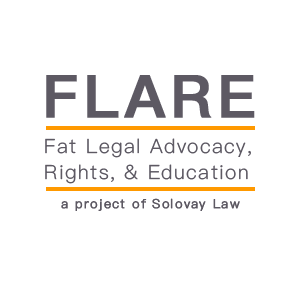Weight and Height Discrimination:
U.S. Legal Protections
The United States does not have a federal law prohibiting weight and height discrimination. Some people are protected under disability laws including the Americans with Disabilities Act, but this is determined on a case by case basis and varies greatly by location. Fat people may also be protected from at least some forms of weight discrimination by the US Constitution itself, but no case has specifically tried this issue to see. Until federal-level protections are clear and reliable, it is important to create specific individual state and local laws to prohibit weight discrimination.
Some places that have laws, rulings, and Executive Orders related to weight are listed here, along with links to more information. The locations vary in the ways and extent that they protect people from discrimination.
(Please note that laws, regulations, and interpretations often change. The information below is a starting place, however we cannot guarantee its’ timeliness or accuracy. To determine your rights and responsibilities, check with an attorney licensed to practice law in your area.)
State and Local Laws
Binghamton, New York
- Height and/or weight are protected.
Madison, Wisconsin
- Physical appearance is protected.
Michigan
- Executive Order 2020-64 (COVID-19) Affirming anti-discrimination policies and requiring certain health care providers to develop equitable access to care protocols: Scarcity protocols of designated healthcare facilities (including hospitals) must prohibit medical decision-making based on social stigma or stereotypes related to many things including height and weight.
- Height and/or weight are protected.
New York City, New York
- Height and/or weight are protected.
San Francisco, California
- Height and/or weight are protected.
- Compliance Guidelines to Prohibit Weight and Height Discrimination
Santa Cruz, California
- Physical characteristics are protected.
Urbana, Illinois
- Personal appearance is protected; categorizing or classifying a person is not allowed.
Washington, D.C.
- Personal appearance is protected.
Legal Cases and Guidance
State of California
The State of California does not explicitly protect people from weight discrimination, however, on June 9, 2020, the State of California’s Department of Public Health released amended Crisis Care Guidelines. These Guidelines emphasize nondiscrimination across many populations: Healthcare decisions, including allocation of scarce resources, cannot be based on age, race, disability (including weight-related disabilities and chronic medical conditions), gender, sexual orientation, gender identity, ethnicity (including national origin and language spoken), ability to pay, weight/size, socioeconomic status, insurance status, perceived self-worth, perceived quality of life, immigration status, incarceration status, homelessness, or past or future use of resources. [Emphasis added.] For an easy-to-understand summary of the Guidelines, see Summary of California’s Revised Crisis Care Guidelines.
In addition, in the past, California declined to pass disability regulations limiting the coverage of weight under disability law. While this was not an affirmative protection, it was an affirmative choice not to exclude higher weight people from legal protections.
State of Washington
In the case Taylor v. Burlington Northern Railroad Holdings, Inc., the Supreme Court of the State of Washington explicitly ruled that “obesity” qualifies as an impairment under the law, so people in Washington have some protection from discrimination based on “obesity.”
